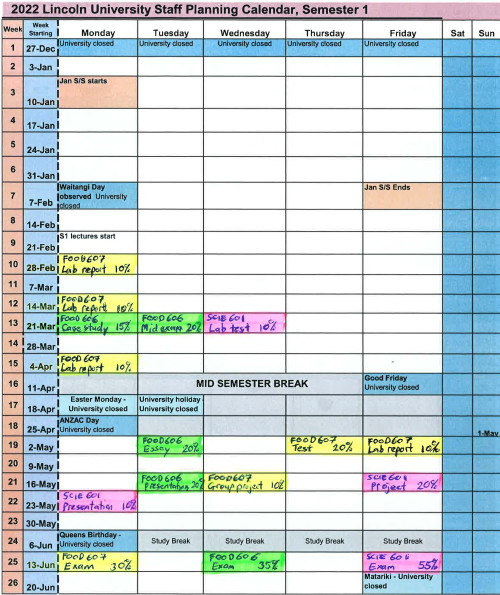Managing your time
Learn to better manage your study time at university.

Set goals to prioritise your time. Even if you do not have long-term goals, such as completing a programme or getting into a dream career you want, you can at least set medium-term goals, such as achieving a mark you want for this semester, or short-term goals, such as completing daily “to do” tasks for the day.
Time Management
Time Management

While you may be provided with a lecture, lab or tutorial timetable, you will not be provided with times for revising your course material or be told when to start your next assessment. So, you need to set times for these tasks in your own time schedule, planning for both the semester and the week ahead. The following four tips will help you manage your study time better.
1) Write all assessment due dates onto a single calendar sheet
- Go to the course outlines for each course and find the assessment due dates.
- Write all assessment due dates and assessment weightings (how much of your total course mark they are worth) on a single annual calendar or semester planner, colour coding each course, as shown in the figure below. You can pick up a printed template of the Planner from Academic Success in the Library, Room L003.

Example planner
- Having a single due date sheet/calendar helps you visualise heavier or lighter workload periods during the semester. If multiple assessments are due in the same week, it’s a good idea to get started earlier than you otherwise would to reduce workload pressure points.
- Writing assessment weightings on the same sheet indicates time to dedicate to each assessment. A 25% report requires more time than a 5% report.
2) Break up major assessments into smaller tasks
A major written assessment is actually a series of smaller tasks. A 30% essay involves doing tasks like:
- Analysing the question
- Finding information on the assignment topic
- Reading and taking notes
- Organising a structure for key points you want to make
- Writing your first draft
- Revising and refining your draft
- Checking your referencing
- Editing and proofreading.
Work back from the assessment due date and calculate a start date (giving yourself enough time to complete all tasks). Put this assessment start date into a weekly planner or diary, and start then. Setting a suitable start date ensures you have enough time to do research, plan your assessment, write/rewrite, reference appropriately and edit without running out of time. This cannot be done in a couple of days. You don't want insufficient time for finding enough quality information on your assessment topic, writing the assessment and completing a thorough proofread of your work before submitting it.
Another thing you can do is set start dates for each individual task along the way, for example, “Find information for Ecology report”. Breaking up a larger job into more achievable parts can be very helpful.
3) Plan your week ahead
Apart from highlighting assessment tasks in your weekly planner, it is useful to include regular revision times for each of your courses. Keeping up with course material is critically important for success, falling behind will just make you feel stressed and frustrated. To avoid this, please write revision times into your diary.
The Akoraka | Learn pages contain the essential material that you need to revise each week: which can include slides, recorded lectures, textbook and journal article readings, videos, quizzes, etc. It is important that you identify your other weekly activities in your diary (eg training/game day, part-time work, etc) so that you can plan when to work on assessment tasks, when to revise course material each week and when you can attend to your social life.
4) Make daily to do lists
- Writing daily “to do” lists help motivate you to complete all daily tasks without forgetting anything. (Feels nice to tick things off too.)
- Consider your own body clock and study at a time of day that suits you.
- Aim for a series of short study sessions with regular breaks.
- Make sure to give yourself rewards for completing tasks. You will need to use methods like this to motivate yourself.
- Balance out your study with social, sporting or community activities: university clubs, sports, the gym etc. You are more than just a study robot. Rest and recreation will balance out your studies and give you time to re-charge your batteries.
- Become self-aware of your study distractions. Find strategies for managing distractions. For example, if gaming distracts you, schedule gaming into your weekly calendar, as a reward for tasks completed.
- Plan a regular place to study. This could be in the library, in Grounded or somewhere else where you will not be distracted and feel productive. No one is the same, so do what works best for you.
Get Individual Advice
Talk to Academic Success or attend one of our workshops for help with your study.


